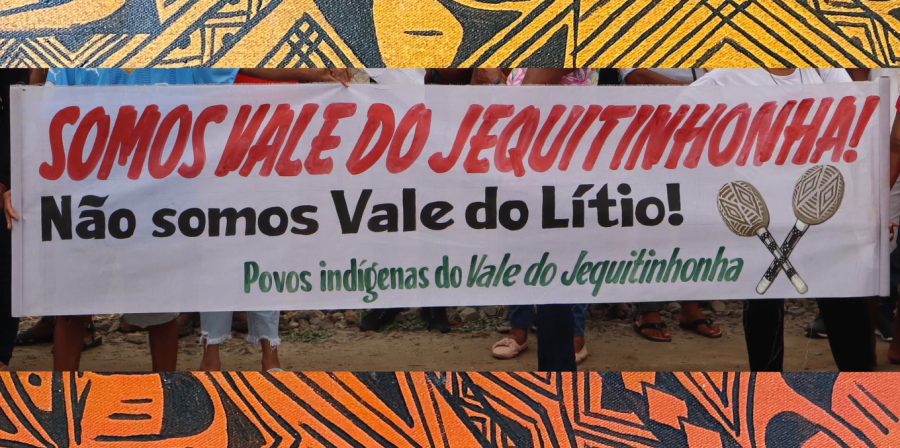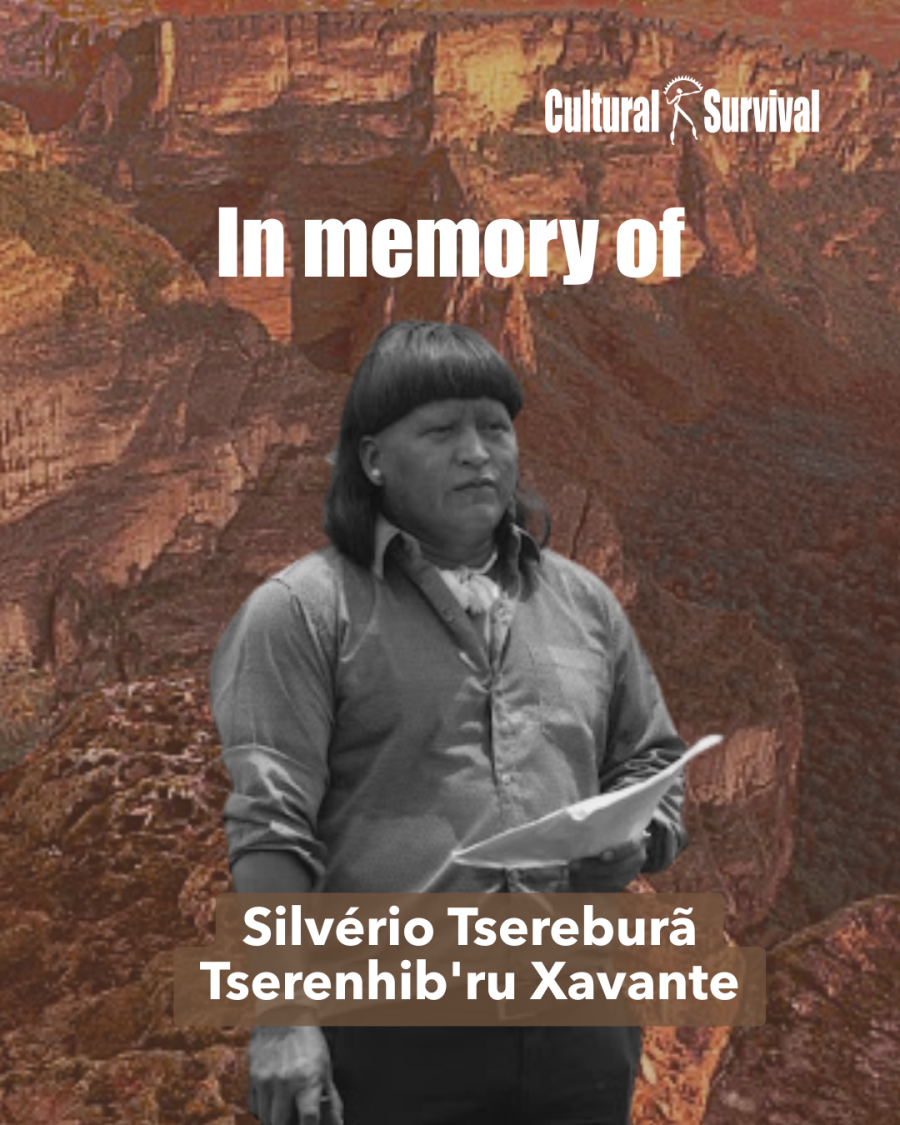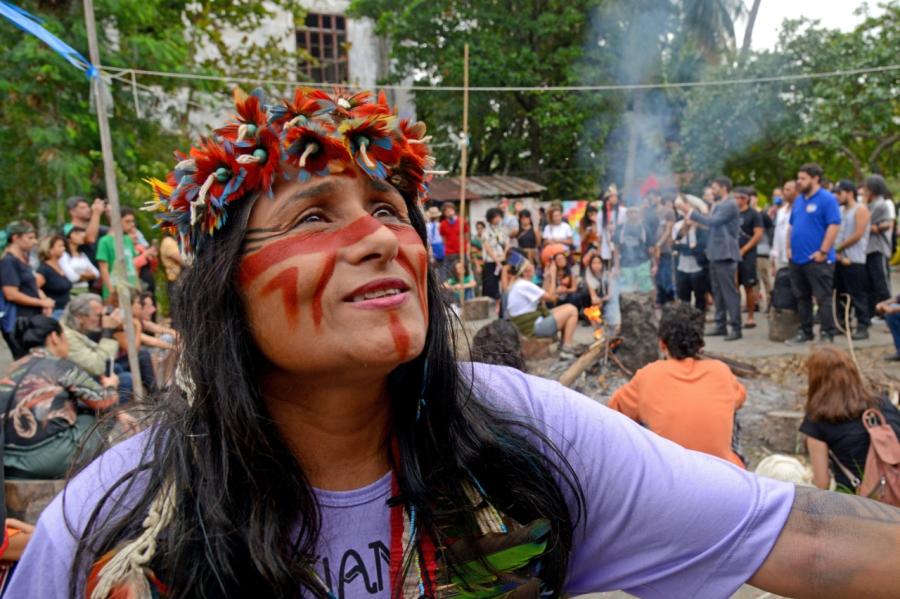Eliane Potiguara is president and founder of the Indigenous Women's Educational Group (GRUMIN) in Brazil. A Potiguara Indian, she took part in the Intertribal Committee for 500 Years of Resistance during the International Indigenous Peoples Conference at the 1992 Earth Summit in Rio. She is a director and member of the International Indigenous Treaty Council. GRUMIN, which is mainly a Potiguara organization, seeks to pass on its experiences to all indigenous women. Nicole Cassinelli, who works with Cultural Survival Enterprises in Brazil, interviewed Potiguara.
I was born in Rio de Janeiro, come from a family of immigrants, and fight for indigenous and women's rights because of my personal experience. For 13 years, I've been trying to find a reason why my family had to secretly escape and move to a big city.
I'm very happy because I have just recovered my family's original documents that confirm what was told to us by older generation. This discovery is very important to me because it gives me security and makes me aware that the fight must go on.
Many people in Brazil were once torn away from their communities, and they later suffered much discrimination trying to recover their loss. For example, we spend most of our lives trying to reaffirm that we are Indians, and then we encounter statements like, "But you wear jeans, a watch, sneakers, and speak Portuguese!" The society as a whole is very discriminatory, and this is learned in school through what's taught in Brazilian history. Society either understands Indians all made-up and naked inside the forest or consigns them to the border of big cities.
I consider myself an exception because I acquitted a level of education that's very rare in Brazil, even though my mother, grandparents, and the rest of my family are illiterate. As a child, I was constrained to my home and school. When I was in school, my grandmother waited outside and watched me to make sure I didn't speak to any other child.
My mother, my aunt, and my grandmother were strong women and fought for their beliefs. They passed on to me their spiritual and cultural knowledge, and now that's being invested in the indigenous people's fight. By the end of the year, I'll return to the indigenous community to live.
STRENGTHENING THE SPIRIT
The most important need for indigenous peoples is organization. We have noticed that the indigenous process began after the creation 12 years ago of the Union of Indigenous Nations, Brazil's first national indigenous organization. UNI has most certainly opened up the opportunity for many other institutions to emerge. Since UNI began, more than 100 groups have emerged throughout the country. That is due to the importance of regaining indigenous culture, traditions, and language, and of the fight for human and indigenous rights.
We have never had to learn how to be indigenous leaders, nor have we been taught by anyone; it is innate. How we fight and defend our rights is a totally spontaneous reaction motivated by our own suffering, be it inside our own immigrant homes or inside our indigenous communities. Once we are given education, we quickly realize how things follow the wrong path in this country.
When I'm asked what the results of our work will be on a long - and short-term basis, I can only say that one decade of fighting is valid not only for GRUMIN but for the hundreds of indigenous organizations that exist in all of Brazil today. These organizations have provoked the awareness and collective work that are essential for the indigenous rights movement in Brazil, as well as for international indigenous movements.
The result of a 10-to-12-year fight is the construction and realization by GRUMIN of an indigenous "Women's House." We'll be opening a space for interpersonal exchange where women will be able to talk about their culture, traditions, roots, pains, discrimination, and their history, and without suffering any kind of discrimination. These women will eventually strengthen their own group and their family and community.
I myself began fighting on an international and national level, but about three years ago I realized we needed to be stronger on a local basis. Since then, GRUMIN has begun to invest more in that, and we decided to build the Women's House for the purpose of professional training and forming leaders. It's a local project but with a national perspective, because there's a plan for 16 women from other parts of the country to work with us.
We understand that it's important to strengthen our spiritual selves and our indigenous origin. This awareness has been acquired as a result of a lot of fighting, suffering discrimination, and even physical, emotional, and political violence. GRUMIN will focus on both the spirit and the Potiguara tradition.
Today the indigenous Potiguara territory has about 55,000 acres of the 143,000 that once existed. The land is totally deforested; the land exploiters, past and present, destroyed our land - the sea, the lakes, the rivers, and the streams. There is a lot of disease because of pollution in the area. The pollution is also a reason why we have lost 80 percent of our natural-resource productivity.
Now that we have regained the indigenous territory taken by the invaders, we are fighting for a reforestation project for that area. We believe that implementing this project is important because of the hundreds of fruits, animals, fish, and shellfish that were lost. We would also like to start focusing on our health and decertification problems and on finding a way to harvest our products. And there is interest in creating a fishing cooperative so that while women bring home some money for producing handicrafts in the Women's House, men will fish and their expenses will be shared.
In addition, we're aware that the United Nations is discussing the issue of intellectual property rights. This is very important because many people have become rich at our expense with our natural resources, indigenous techniques, etc. It's our right to secure our culture and consequently be paid for what is ours. It's very important for us to be able to export medical know-how and our plants for different kinds of medicine, cosmetics, and other products, as long as this is coordinated by our community. In the Potiguara territory, we plan to introduce a jelly made from fish spines that is good for bones and skin.
In the last few years, studies have been conducted on what happened historically, geographically, socially, and economically to the indigenous society. But while many of these issues are important, we still don't have a program that focuses on the community's practical reality - on issues like health, education, and agriculture. For example, a lot of caju, mangaba, papaya, and coconut is wasted because there is no marketing and processing program, and transportation, communication, and making contacts are difficult. Yet these can't be a priority while we are still fighting about basic survival problems, such as health, malnutrition, and childhood mortality.
EQUAL TO EQUAL
The slogan of a campaign we are taking to the United Nations is "The Potiguara people are hanging by a thread. Help!" Our situation is an emergency. If we don't fight now, we will soon have no land, no culture, no traditions, and we don't want that!
The Potiguara indigenous movement focuses 100 percent on preserving Potiguara land and the people's culture, traditions, spirituality, language, and costumes. Our people went through a very strong deculturization process, and I can't ignore the fact that the largest destroyers of our land and culture were very paternalistic ideologists like the "cross and sword."
Today, the Potiguara people do not have a "patron." Our people stand up for themselves. After becoming aware that our people had gone through a deculturization process, we decided to fight for our own history. Now, when other groups want to work with us, it should be on a democratic, equal-to-equal basis, where we all sit around a table to discuss what would be best for our future and in what way they could help us. We're in need of legal and technical assistance, but we can do without paternalism. The paternalistic way left deep marks in some indigenous nations that became accustomed to receiving things ready-made instead of working and fighting for them.
This philosophy is over. It's necessary for indigenous groups to work, produce, and develop themselves in a sustainable way - economically, socially, and politically. I call this indigenous autonomy, and it can only become real if the process begins inside our own communities. Groups that wish to support us should approach us with a conception of equality and respect. For example, the World Council of Churches supported our work without imposing any kind of ideology. They gave us the freedom to choose what we should do with the money, and we wrote a book called The Earth Is the Indian's Mother that illustrates how the racial discrimination began that destroyed or weakened our culture and traditions.
Most indigenous people this year are protesting against the 500 years of colonization. They recognize the effects of these 500 years in their lives. This is a moment for reflection. Five hundred years of history, and the Potiguara people are still alive. This shows that the people have resisted, despite the difficulties.
1993 will also be an important year for indigenous people because the "Declaration on the Rights of Indigenous People" will be published. This declaration is being developed in a working group, of which I am a member, at the United Nations. In addition, different communities and organizations in Brazil are reevaluating this country's Indian Statute. Our objective is to advance the indigenous movement by strengthening it on a national scale.
Indians are beginning to realize that they have to trace their own path by taking their destiny in their own hands. In 10 years we'll be harvesting what is planted today.
Projects for the Future
Country: Peru
Project: Integrated Family-Community Farm Project (HIFCO)
HIFCO responds to the commitment made by Peruvian indigenous people to defend their land, natural resources, and culture. Affiliated with AIDESEP, an Indian organization representing more than 30 federations in the Peruvian Amazon HIFCO combines technical training in integrated agricultural methods with health and nutrition education.
HIFCO focuses on helping communities restore degraded lands and encouraging small-animal husbandry, fish farming of native species, and the cultivation of a variety of crops, especially those of high nutritional value. In 1992, it began to decentralize its activities from one pilot project to five communities.
Project HIFCO aims to: * exchange theoretical and practical experiences of integrated agriculture among communities and ethnic groups; * analyze activities that lead to environmental pollution and destroy the forest; * establish links among communities to exchange experiences and support.
HIFCO organizes courses and seminars, conducts community visits, establishes demonstration plots, and distributes bulletins and pamphlets. Its multi-week training programs include entire families, rather than select individuals. Local teaching methods, such as myths and tales, are incorporated in the education activities, allowing both children and adults to participate.
Address: Proyecto HIFCO, Apartado 575, Pucallpa, Peru or Proyecto HIFCO, c/o AIDESEP, San Eugenio 981, Santa Catalina, Lima 13, Peru
Article copyright Cultural Survival, Inc.



